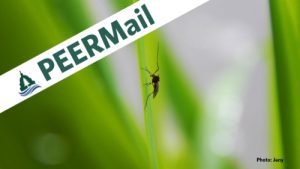Aerial Spraying PFAS in Massachusetts
 Today, PEER released test results it commissioned from a private lab showing per- and polyfluoroalkyl substances (PFAS) in a widely used pesticide, Anvil 10+10, which is aerially sprayed on millions of acres of land in Massachusetts, Florida, New York and at least 23 other states. When PEER received the results, it notified the Massachusetts Department of Environmental Protection, which subsequently tested and also found PFAS in Anvil 10+10 samples.
Today, PEER released test results it commissioned from a private lab showing per- and polyfluoroalkyl substances (PFAS) in a widely used pesticide, Anvil 10+10, which is aerially sprayed on millions of acres of land in Massachusetts, Florida, New York and at least 23 other states. When PEER received the results, it notified the Massachusetts Department of Environmental Protection, which subsequently tested and also found PFAS in Anvil 10+10 samples.
PFAS are often referred to as “forever chemicals.” They are linked to a range of serious health problems, including cancer, liver damage, and reduced immune functioning. New studies have found that elevated PFAS exposure might worsen the severity of Covid-19 infections or potentially impair a vaccine’s function.
PEER launched this investigation because many Massachusetts communities struggle with PFAS contamination in their water supplies, without an obvious source of the chemicals. We suspected one source of this contamination could be the use of insecticides. PEER found patents showing chemical companies using PFAS in pesticides, and recent articles discuss the variety of pesticides that contain PFAS as either an active or an inert ingredient.
In 2019, Massachusetts aerially sprayed 2.2 million acres of the state with Anvil 10+10, and, in 2020, sprayed roughly 200,000 acres. Many more acres were sprayed from trucks, and Anvil 10+10 is also used in some home misting systems. Therefore, the potential for PFAS from Anvil 10+10 reaching the Commonwealth’s waters is high.
“The frightening thing is that we do not know how many insecticides, herbicides, or even disinfectants contain PFAS,” says PEER Science Director Kyla Bennett, who is leading the PEER investigation in the use of PFAS in pesticides. “It is nonsensical to deliberately spray millions of acres with PFAS-contaminated pesticides while states are grappling with developing regulatory limits for PFAS and cleaning up contaminated drinking water.”
This debacle is another example of EPA failing to protect the public and wildlife from toxic chemicals, and allowing corporations to withhold crucial information about what substances are actually in pesticides. We have asked EPA to take immediate steps to investigate the use of PFAS in pesticides and report its finding to the public.
But that will not be enough. EPA has a long history of working with the chemical industry to hide information from the public and undermine efforts to limit the use of toxic pesticides. Congress needs to step in and pass legislation that stops the introduction of toxic forever chemicals into the environment and our water sources to protect public health.
Giving Tuesday
Today is the day! #GivingTuesday is all about supporting nonprofits that are doing great work – work like fighting for clean air and water, demanding scientific integrity, and supporting public employees who feel their agencies are falling down on the job of protecting the environment. This year we’re trying to reach a goal of $5000 – which goes towards keeping our work and representation of public employees completely pro bono. Will you help us?
More PFAS found in Maryland Water and Seafood
PEER testing has found troubling levels of PFAS in drinking water in Montgomery County and in striped bass, oysters and crabs taken from the Chesapeake Bay. read more >